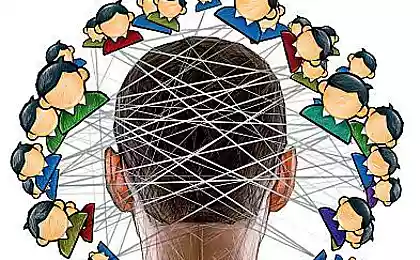464
About empathy in social networks
Why do you think the instagram live perfect people in a non-existent world, which all in their places, and in my thoughts — a solid beauty, constant innovations and socially acceptable opinions?
First, love all the hearts and attention. Some of the pictures, I think many of us are spread specifically in the moment when you really need support — to encourage when things go wrong, and to not have to say anything about how and what is bad. Digress.
Eighty nine million sixty five thousand seventy seven
Secondly, the frame is not flagged dirty bottle lying in the middle of an idyllic beach, because nobody wants to cycle on bad. Everyone wants to preserve the journey in memory without any spoons of tar.
And all? I think not.
There is another (third) types of reactions are coming in response to what we write, publish, post.
At pictures of perfect people in a non-existent world goes is not the same reaction than stories about what goes wrong.
Photos and posts about the beauty, joy and goodness nice support, thumbs up, comment. Share the joy everyone loves. In addition, it will only grow.
But on the other side, doubts, shadows are difficult to say.
These themes are crawling with shame, fear of rejection, guilt for his wrongness.
Before post something heavy, I several minutes to several days going in circles. Because it's scary: what would you say? Will I be able to explain their thoughts? Understand it correctly? Say what will support me? Say nothing if that's appropriate? How do I feel?
The response to serious and complex is very different. And it's not always unbearable. Sometimes the response arrives so that I do not sleep three nights and crying in the therapist's office. Because I hit a sore spot.
Perhaps you, too, before hitting the "post" button weigh in the palm of possible answers. And primaries, ready for him. And sometimes you press "Cancel".
Press the Cancel is so nice and easy. Publish — ugly.
As you can see in my blog last year, I try to speak on unpopular topics.
A couple of days ago, I honestly admitted that I have no mood. A year ago I would have thought that talking about it — fu to be, why do people better to SHARE the INSPIRATION. But the feeling of "you're not alone" is even more potent than the inspiration and what an inspiration, right, can honestly share the man who has no sentiment? To be dishonest with yourself and others — that is now for me, "fu to be".
I am learning to not tell about the growth-the development-the achievements, not caramel-a delightful travel and desire for an improved version of yourself (and that's fine, the beginning is always in a safe place),but about something else. On the discontent. A sense of shame and nepodhodyaschee. About disappointment in himself and his illusions. About body and soul. About complex experiences, in General.
For me it's a form of release. When something difficult is lived, experienced, understood and articulated post in the blog or social network represents for me the end (or at least output to a new round). Opens a new cycle. I hear about how the same home to other. Tamped their experience and leave him alone. Go on. To new experiences.
To talk about the hard in life, I have a lot of time and effort to understand yourself. And also a choice of what I finished and what not ready to talk right now.
But no matter how I prepared and no matter how perfect was not a text in which I talk about the difficult, the response arrives is very different. And this post is about her. I now re-read the book Brehna of empathy and think again about what it is and what is not.
Of course, part of the response to your text I programmed myself — topic and the language in which you write the selected message, nested senses, maturity of approach, refinement of question.
But this is only 50%. The reader is giving their 50%.
Brené Brown warns that to be vulnerable — not even the most difficult. Perhaps even more difficult to be present at the vulnerability of the other and show empathy while still in contact.
Empathy, says Braine, is the ability to be responsive, to respond to people concern. It involves the ability to put yourself in the place of another — to understand what a person is going through, and share your understanding. When we share a stressful experience with others and we respond openly, with a sincere complicity, that's empathy.
Ninety million one hundred ninety five thousand nine hundred forty two
I see it in myself and I see it in readers: sometimes flies a very empathic response.And what?
1. Devaluation under the guise of caring(calm yourself, to not have to spend emotional strength to engage in other people's problems)
Quick decisions and unsolicited advice(to remove anxiety, you need to figure out how to solve the problem. Preferably urgently, once and for all. I at this point no matter what could be more important to tell and to listen)
Uninvited wishes
Empathy is not just to find the right words and say them what to be ashamed of. Our words will act only when we can really take the side of the interlocutor and to fully engage in conversation with him.
I define empathy as the ability to dive into his emotions, to access emotions, which shares the other.
Eighty four million one hundred four thousand six hundred sixty
ARN Ivey, Paul Pederson and Mary Ivey describe empathy as "the ability to perceive the situation from the point of view of another person. The ability to hear, see and feel the unique world of the other."
What would I personally like to hear in response to a story about difficult experiences? Something simple and sincere.
Empathy, says brené, not in the "correct" wording, and the sense of connection between people, the contact between the two individuals. It is not through words pours. And through the senses, feelings, emotions and through the body. Empathy cannot be faked.
I think I have four years thinking about this empathy and try to show it — when crooked when erect, as lucky.And only now beginning to feel what it is actually and what her incredible power.published
Author: Elena Trushkova
P. S. And remember, only by changing their consumption - together we change the world! ©
Source: //anotherindianwinter.ru/post/160331854608/vulnerability
First, love all the hearts and attention. Some of the pictures, I think many of us are spread specifically in the moment when you really need support — to encourage when things go wrong, and to not have to say anything about how and what is bad. Digress.
Eighty nine million sixty five thousand seventy seven
Secondly, the frame is not flagged dirty bottle lying in the middle of an idyllic beach, because nobody wants to cycle on bad. Everyone wants to preserve the journey in memory without any spoons of tar.
And all? I think not.
There is another (third) types of reactions are coming in response to what we write, publish, post.
At pictures of perfect people in a non-existent world goes is not the same reaction than stories about what goes wrong.
Photos and posts about the beauty, joy and goodness nice support, thumbs up, comment. Share the joy everyone loves. In addition, it will only grow.
But on the other side, doubts, shadows are difficult to say.
These themes are crawling with shame, fear of rejection, guilt for his wrongness.
Before post something heavy, I several minutes to several days going in circles. Because it's scary: what would you say? Will I be able to explain their thoughts? Understand it correctly? Say what will support me? Say nothing if that's appropriate? How do I feel?
The response to serious and complex is very different. And it's not always unbearable. Sometimes the response arrives so that I do not sleep three nights and crying in the therapist's office. Because I hit a sore spot.
Perhaps you, too, before hitting the "post" button weigh in the palm of possible answers. And primaries, ready for him. And sometimes you press "Cancel".
Press the Cancel is so nice and easy. Publish — ugly.
As you can see in my blog last year, I try to speak on unpopular topics.
A couple of days ago, I honestly admitted that I have no mood. A year ago I would have thought that talking about it — fu to be, why do people better to SHARE the INSPIRATION. But the feeling of "you're not alone" is even more potent than the inspiration and what an inspiration, right, can honestly share the man who has no sentiment? To be dishonest with yourself and others — that is now for me, "fu to be".
I am learning to not tell about the growth-the development-the achievements, not caramel-a delightful travel and desire for an improved version of yourself (and that's fine, the beginning is always in a safe place),but about something else. On the discontent. A sense of shame and nepodhodyaschee. About disappointment in himself and his illusions. About body and soul. About complex experiences, in General.
For me it's a form of release. When something difficult is lived, experienced, understood and articulated post in the blog or social network represents for me the end (or at least output to a new round). Opens a new cycle. I hear about how the same home to other. Tamped their experience and leave him alone. Go on. To new experiences.
To talk about the hard in life, I have a lot of time and effort to understand yourself. And also a choice of what I finished and what not ready to talk right now.
But no matter how I prepared and no matter how perfect was not a text in which I talk about the difficult, the response arrives is very different. And this post is about her. I now re-read the book Brehna of empathy and think again about what it is and what is not.
Of course, part of the response to your text I programmed myself — topic and the language in which you write the selected message, nested senses, maturity of approach, refinement of question.
But this is only 50%. The reader is giving their 50%.
Brené Brown warns that to be vulnerable — not even the most difficult. Perhaps even more difficult to be present at the vulnerability of the other and show empathy while still in contact.
Empathy, says Braine, is the ability to be responsive, to respond to people concern. It involves the ability to put yourself in the place of another — to understand what a person is going through, and share your understanding. When we share a stressful experience with others and we respond openly, with a sincere complicity, that's empathy.
Ninety million one hundred ninety five thousand nine hundred forty two
I see it in myself and I see it in readers: sometimes flies a very empathic response.And what?
1. Devaluation under the guise of caring(calm yourself, to not have to spend emotional strength to engage in other people's problems)
- Oh, come on — nothing.
- Found nothing to worry about.
- But you have that…
- Haha, also my problem!
- You know, if everyone starts to complain…
- I agree that you have a privileged position.
- ...and other versions of the promise "in Africa children are starving".
Quick decisions and unsolicited advice(to remove anxiety, you need to figure out how to solve the problem. Preferably urgently, once and for all. I at this point no matter what could be more important to tell and to listen)
- Oh, I had such a problem. And that's what I did…
- One of my friend also faced…
- Have you tried...?
- I read this book, and there... (my favorite — ever it falls through)
- What is it you idiot! Throw it will find you someone with brains.
- You don't realize it, but the problem you have is the following (link to article)
- Look, just like me! (more history on the half hour)
- I'd better tell you how…
- Optimism (unfounded and quite brutal, if he is not comforted by the addressee)
- Everything will work out!
- All will be well.
- Times were so bad, the logic will have to be good.
- Black stripe will be replaced by white.
- But I have today…
- Well, as it happens (you curious little animal, for you interesting to watch)
- You're done (I don't know your story, but don't want to admit it, you just gonna have to change the subject)
- What a nightmare that this happened! (and what a relief that this has not happened to me)
- Didn't know that this could deliver as much suffering (Yes, you weakling, and I didn't)
Uninvited wishes
- Let everything will work out! (then I won't have to hear the story of not adjusted, I'm uncomfortable and want to stop)
- Want to make you happy (I know what you need and fervently wish my personal favorite, I just started from it somehow to get rid of this year)
- Of power to you! (what can I say something? What can I say something? What can I say something???)
- I wish to forget it all and move on with head held high. (because it would be a shame to remember what actually happened. And our conversation I would prefer to forget)
Empathy is not just to find the right words and say them what to be ashamed of. Our words will act only when we can really take the side of the interlocutor and to fully engage in conversation with him.
I define empathy as the ability to dive into his emotions, to access emotions, which shares the other.
Eighty four million one hundred four thousand six hundred sixty
ARN Ivey, Paul Pederson and Mary Ivey describe empathy as "the ability to perceive the situation from the point of view of another person. The ability to hear, see and feel the unique world of the other."
What would I personally like to hear in response to a story about difficult experiences? Something simple and sincere.
- Thank you for sharing. I thought to myself on this topic. Can I'll tell you later what I come? (you're right, this story touched me, I'm not trying to forget her, I want to delve into ourselves, we can continue to talk about it)
- I understand what you're going through. I know I need a lot of courage to talk about it. It is important to write about this. (I approve of your courage and are ready to be with someone who shares complicated)
- I have the same or very similar. Thank you for saying how great you are. (we look like and experience like that, you're not alone)
Empathy, says brené, not in the "correct" wording, and the sense of connection between people, the contact between the two individuals. It is not through words pours. And through the senses, feelings, emotions and through the body. Empathy cannot be faked.
I think I have four years thinking about this empathy and try to show it — when crooked when erect, as lucky.And only now beginning to feel what it is actually and what her incredible power.published
Author: Elena Trushkova
P. S. And remember, only by changing their consumption - together we change the world! ©
Source: //anotherindianwinter.ru/post/160331854608/vulnerability























